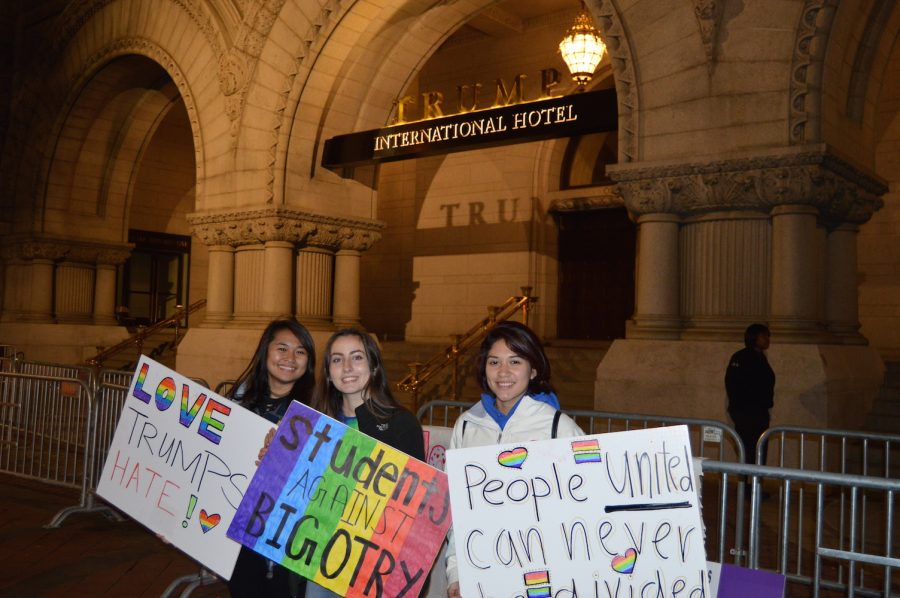Students reflect on new President-Elect
Madison students protest in front of the Trump hotel.
November 29, 2016
17 months ago, Donald J. Trump announced his candidacy for the President of the United States. From the beginning of the campaign, Trump, a very successful businessman and real estate developer, was not taken seriously, because he had no prior experience serving in the government or military. Now, a year-and-a-half later, millions of Americans are either in joy or despair as they wait for President-Elect Trump to take office.
Over the general election period, both candidates were juggling issues of their own relating to events inside and outside of each campaign. Since the early stages of his campaign, Trump has been deemed a racist and sexist figure by 44% of Americans according to a Suffolk University Poll. His use of racial stereotyping and radical policy was believed to be detrimental to voter support and turnout.
On the other side, Democratic Nominee Hillary Clinton faced an ongoing investigation into her use of a private email server for State Department business.
“Clinton’s 30 years of corrupt political experience allowed her to develop a strategy in which she masked her unruly temperament,” Megan Craven (’17) said.
Although she was not under constant fire by the Federal Bureau of Investigation (FBI) during the entire election, FBI Director James Comey reopened the investigation just 11 days before the General Election, bringing panic to the Clinton campaign. In addition to the private email server, Wikileaks, an independent organization, found and released emails that showed collaboration between the Democratic National Committee, the media, and the Clinton Campaign.
Despite the argued flaws in each candidate’s policy and temperament, Clinton was favored throughout polls across the board heading into Nov. 8. The Democratic Party, who thought it would soon be in power, now finds itself in a state of crisis. The question the Democrats are asking themselves is the same question being debated in the media: How did Hillary Clinton lose the election?
From the beginning of his campaign, Trump appealed to a group of white, blue collar workers who have not always identified with the Republican Party, or who have not identified with any party at all. The Clinton campaign ignored this same group of working-class, rural American voters who felt they had been left behind by the country and the political system. Not only did the Clinton campaign ignore them, but pre-election polling missed them as well.
These voters had been absent for so long, they were not taken into consideration in polling models.
“A lot of people, particularly those in the Midwest, responded to Trump’s overarching promise of change,” Andrew Prince (’17) said. “However I am highly skeptical that he, or anybody, honestly, will ever be able to restore economic prosperity to this region, and it seemed as though these Americans somewhat voted against their self-interests in many cases, as they were attracted to Trump’s idealistic promises and did not evaluate his policies rationally.”
Looking back on the election, we can say Trump’s message truly resonated with them. It mobilized these voters and turned the blue Rust Belt to red.
As we look into how this upset unfolded, it is also important to consider the role played by the media in this election. In this polarized country, most media sources outwardly express their political views and affiliations, and it is difficult to find a media source that is dead-center on the political spectrum. In this past election, some argue that the media did not accurately depict the tone of the race, rather, they promoted the Clinton campaign in a more positive manner, creating the illusion that the campaign was doing better than it actually was.
Now, it will be interesting to see if or how Trump’s agenda will change, as he is no longer on the campaign trail. Slight deviations from his original plan, which won the election through the silent majority, have already been noticed. These changes will hopefully appeal more to the country as a whole and act in the people’s best interest.



